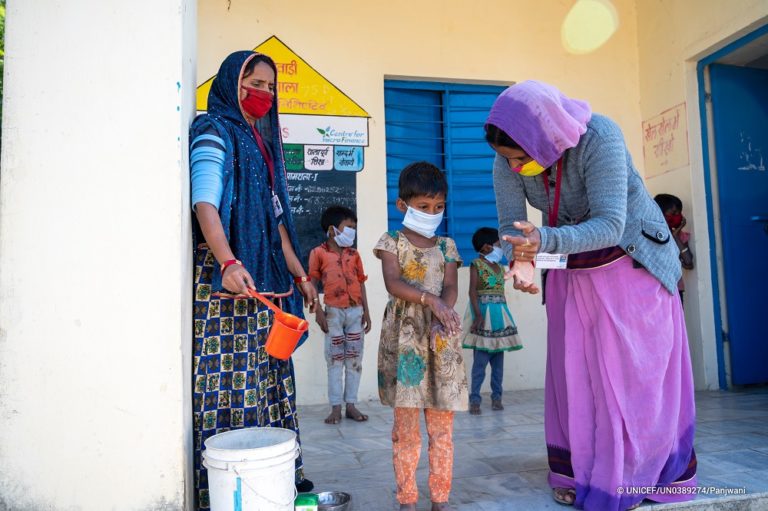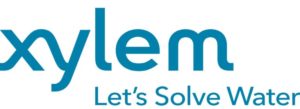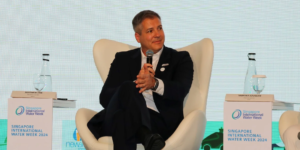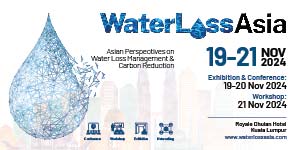Xylem Partners with UNICEF to Create a Brighter Future for 3.4 Million Children in India

AWW and Sahaika demonstrate hand wash techniques to kids. Village Amthala, Abu Road, Rajasthan (Image source: Xylem Inc.)
Aligned with the UN Sustainable Development Goals, the partnership seeks to improve awareness of water, sanitation and hygiene (WASH) in India’s most vulnerable communities, with a focus on strengthening WASH protocols in schools and pre-schools, known as anganwadi centers.
Currently, 25% of children in India experience high water vulnerability, and half of all schools lack adequate hand washing facilities (Source: https://www.unicef.org/media/95241/file/water-security-for-all.pdf). Water poverty is worse in rural communities and among pre-school children, where one in every three children lack access to a basic water service and more than a quarter of children (26%) are without toilet facilities. UNICEF’s WASH program, formed in partnership with the Indian government, centers on 15 states and 192 districts. The program provides technical support to the government and mobilizes partners to build WASH facilities and strengthen hygiene practices, which are inherently linked to child growth, development, school attendance and learning outcomes. Xylem Watermark’s funding will enable UNICEF to reach more children through their WASH in schools and pre-schools program, ultimately preventing disease and supporting long-term behavioral change.
“Availability and access to safe water and sanitation is fundamental to improving the health and well-being of millions of Indians,” said Austin Alexander, Vice President of Sustainability and Social Impact at Xylem. “As part of our work to solve water challenges around the world, we are pleased to support UNICEF in India to accelerate progress towards the UN Sustainable Development Goals of water and sanitation access for all. In doing so, we hope to create a brighter future for communities across India.”
“We are proud to be associated with this remarkable program to help make India water-secure," said Nitin Bhate, Managing Director of Xylem India. "This builds on Xylem’s work to provide our customers across India with innovative solutions to water challenges, and on our broader efforts to improve access to safe drinking water and sanitation for vulnerable communities through Xylem Watermark.”
UNICEF’s WASH interventions in 2021-2023 are expected to help increase the provision of gender-sensitive WASH facilities in rural schools. The program will also support the government in implementing WASH standards in pre-schools and increase the number of UNICEF-supported states with COVID-19 sensitive WASH program plans, and menstrual health and hygiene action plans.
"We’re excited to partner with Xylem Watermark who will be investing in improving services and practices that fulfill a child's right to clean water, sanitation, and hygiene (WASH), notably in their learning environment, more so when it’s crucial to bring them back to schools safely amid COVID-19,” said Nicolas Osbert, Chief of WASH at UNICEF India. “UNICEF remains steadfast in its commitment to ensuring equitable access of WASH through cost-effective interventions within 45,000+ schools across India. Not only could this partnership benefit more than 3 million children, but it contributes to achieving the global SDG-6, where the private sector’s contribution is pivotal."
In 2020, Xylem committed to supporting UNICEF’s COVID-19 relief efforts, helping to reduce human-to-human transmission of COVID-19 by promoting handwashing and personal hygiene practices. The global collaboration was successful in reaching over 3.3 million people with messaging on COVID-19 prevention measures, with over 117,000 benefitting from critical WASH supplies. Additional support included providing healthcare workers with personal protective equipment and training on infection prevention and control measures, and the development of a knowledge management hub for global WASH practitioners.
With UNICEF’s work in 190 countries and territories, the expanded partnership will continue to contribute to achieving Xylem’s 2025 sustainability goals, including commitments to education and disaster-response, and progress towards SDG 6.
Source: Xylem Inc.






